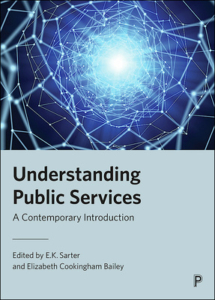From emergency medical services, fire services and waste collection to education, health and social services, public services are a crucial component of our everyday lives. As the external environment changes, public services are facing new and increased challenges which are driving transformation and innovation.
Following the COVID-19 pandemic, which deeply impacted everyday lives, public services and those working within them, the cost-of-living crisis marks the second predicament since the start of this decade. The pandemic left the population as well as the public services workforce with increasingly complex needs owing to interruptions in services and the need to reconfigure their delivery. High rates of burnout and ‘brain drain’ from the sector have been a result.
Staffing numbers in the UK public services sector have dropped, with new qualification requirements and shifts in migration policy restricting access to once-essential recruitment pools. The recovery of the sector’s human capacity is further in doubt with stagnating wages leaving many workers unable to meet their basic needs from their salary alone. Industrial action has spread across many areas, most notably in education and health.
Compounding these challenges is a changing environment. Flooding, droughts and fires, particularly in rural areas, increase the demands on both emergency responders and on public service aid programmes across the globe. A changing political and social climate has led to a crisis of trust in public services to ensure the safety of the population, reflected in the UK in enquiries into the Metropolitan Police, the Grenfell fire and the Mid Staffordshire NHS. This comes alongside major international social movements, such as Black Lives Matter and MeToo, which call for more transparency and oversight of public bodies. Growing attention paid to (in)equality and environmental concerns have inspired a shift in policy priorities in different countries. Have the major management reforms of the last 40 years successfully provided public services with the necessary tools to counter these challenges?
As public services face new issues and seek to innovate, it is more important than ever to understand their ways of working, the new and emerging approaches to the delivery of services and the changing context within which they operate. In response to the challenges and as part of a drive to improvement, they have adopted a range of innovations that may be core for making them fit(ter) for the future. They increasingly seek to assess problems based on their complexity using a more systems-based approach. Having an awareness of the interrelated nature of problems as well as of the interconnectedness of services at every level of decision making helps break down traditional siloed, linear thinking and has the potential to tackle competition for resources. Embracing interoperability across services, with a focus on collaboration, has proven to be one of the most efficient means of ensuring major challenges are tackled effectively. One way of facilitating this increased communication and collaboration is by encouraging hiring practices that prioritise experiences from other sectors and industries. Transferable skills and breadth of experience can also help public service leaders to develop stronger situational awareness to enhance long-term planning.
Another innovation that supports this broader collaborative approach is to draw more extensively on the lived experience of service users. Bringing users into active decision making and service delivery roles attracts expertise and innovation which compliment greater collaboration across services and sectors. This is an area where public and private providers can learn from the voluntary sector. To be most effective and inclusive, this ideally should be paired with capacity building among service users to provide a means of developing their abilities to contribute rather than limiting participation to those with the most time or relevant skillset.
Finally, better integration of digital technologies into public services can enhance not only accessibility of the service but also collaboration between external and internal partners, including other services and service users. Such technologies not only provide spaces for exchange, engagement and feedback, but also opportunities for integrated support between areas to compensate for capacity gaps. The problems of resources needed for digital engagement with public services and issues of digital inclusion must nevertheless be considered.
In Understanding Public Services: A Contemporary Introduction, we examine the external forces that influence public services as well as existing and emerging approaches to accommodate changes and tackle challenges. To be successful in their attempt to innovate and be fit for the future, we argue that public services, and those who work in them, need to be adaptable, forward thinking and attentive to both the local and global communities of which they are a part. It is only by embracing a willingness to change, learn, collaborate and innovate that those public services can meet the variety of challenges they now face, and those yet to come.
Elizabeth Cookingham Bailey is Lecturer in Public Policy and Management at the University of York.
E.K. Sarter is Assistant Professor at the Institute for Employment Research, University of Warwick.
 Understanding Public Services Edited by E.K. Sarter and Elizabeth Cookingham Bailey is available on the Bristol University Press website. Order here for £22.99.
Understanding Public Services Edited by E.K. Sarter and Elizabeth Cookingham Bailey is available on the Bristol University Press website. Order here for £22.99.
Bristol University Press/Policy Press newsletter subscribers receive a 25% discount – sign up here.
Follow Transforming Society so we can let you know when new articles publish.
The views and opinions expressed on this blog site are solely those of the original blog post authors and other contributors. These views and opinions do not necessarily represent those of the Policy Press and/or any/all contributors to this site.
Image alex0631 via Unsplash


